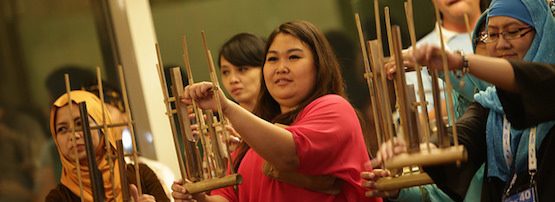
APNIC 40 was our first standalone meeting with more than 450 delegates attending. It was probably also our biggest conference in terms of parallel activities, with an “AP* retreat”, APIX, APIPv6TF, a full APTLD meeting, and a great series of BoFs, tutorials, and workshops.
Reflecting on the event, four things stand out to me:
1. “The best regulation is actually less regulation”
These were the words of Mr Rudiantara, Indonesia’s Minister of Communication and Information Technology who spoke at the Opening Ceremony. The Minister gave an unusually detailed account of Indonesia’s approach to Internet development; from its light-handed and liberal approach to regulation, to its support for a multistakeholder model of Internet governance.
It was encouraging to hear Mr Rudiantara openly invite the Internet community to assist the Indonesian Government in building and adapting to the Internet. This open door is an important opportunity for the local community, which I hope will be recognized and well used.
2. The most popular technology sold today fits in your pocket
IPv6 was again a main theme of this APNIC Conference, with a focus on mobile applications and technologies. Geoff Huston, APNIC’s Chief Scientist, reported that 40% of Internet access today is through mobile devices – which I think is a truly remarkable finding.
Geoff highlighted the new opportunities for the mobile industry to influence the destiny of IPv6, as Apple has done with their recent mandate for IPv6 in iOS applications. He reported on the increased IPv6 rollout among the big three carriers in the USA, and was then followed by Deoknyong Ko from SK Telecom, who reported that the major mobile carriers in Korea are also following suit.
Sunny Yeung, Telstra’s senior technology specialist and technical lead for IPv6 wireless deployment, presented a tutorial on IPv6 for mobile network operators. He covered current challenges, methods and designs to implement IPv6, and how best to future-proof networks. He explained and encouraged the use of an IPv6-only approach, in preference to a dual-stack model still requiring CGNs.
3. The realities of the IPv4 market
Jim Cowie, Chief Scientist at Dyn, spoke to the us about emerging IPv4 transfer market, and about practical issues which are now appearing. He described a number of specific problem cases in transfers, related both to the transactions themselves and to the registration and usability of transferred blocks.
Jim suggested that there will need to be substantial changes in transfer policies, which will protect the buyers and the addresses transferred but without adverse impacts on the transfer market itself. Until then he suggests that buyers should beware and research the historical routing of the space they are purchasing, going back as far as allocation.
It’s interesting to see that even while the IPv4 address supply is coming to an end, policy discussions are still arising. It seems that while there is still a need for IPv4, there is also a strong interest to ensure that the remaining demand can be met in the best way possible.
4. The future of the IP address community
“Community” was a keyword that seemed to come up in many presentations at APNIC 40. For me this conference showed clearly that the APNIC community is active, inquisitive, diverse and growing.
The attendance of 452 delegates, represented 162 Member organizations and 51 economies around the world. This does not include the 87 remote participants who followed the conference on Adobe Connect and YouTube Live.
I was very glad to see that 100 delegates were attending for the first time, and in particular that we welcomed 27 fellows whose infectious energy speaks volumes for the future of the community.
Female delegates at APNIC 40 numbered 74 – a figure that we are trying to continually improve, through fellowships and yet another successful “Women in ICT” event in Jakarta. I do hope to see more and more female colleagues at APNIC conferences in future.
A final note on “Community”, I want to thank the Indonesian Internet community for making APNIC 40 such a success. Our host APJII has a long history of leadership in Indonesia, but it is not alone; the Indonesian Internet community is dynamic and diverse, as any healthy community should be. We saw this in the unique efforts, which supported the highly successful Internet Governance Forum in 2013, and we saw it in Jakarta last week.
I do thank APJII, the Indonesian community, and all who were involved in making APNIC 40 a success.
The views expressed by the authors of this blog are their own and do not necessarily reflect the views of APNIC. Please note a Code of Conduct applies to this blog.

Dear APNIC admin,
Since 08:00 am, Whois Query on whois.apnic.net didn’t receive any answer.
Did you change anything ?
Please let me know how fix this issue !
I’m seeing APNIC Whois queries failing as well. Is there a better place to report this?
I’ve contacted the helpdesk by email. Hopefully there will be a response soon, but since they’re closed on weekends, it might be a couple days.
My apologies for this. Our whois server in California was not responding, but it is back up now. This will be investigated of course.
– Paul.